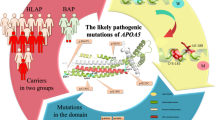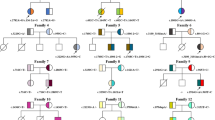Abstract
The aim of the study was to assess the apolipoprotein E polymorphism (apoE) in two familial cholestatic diseases—Alagille syndrome (AS) and progressive familial intrahepatic cholestasis (PFIC)—and to estimate its association with gallstone formation, cholesterol levels, and response to UDCA treatment. We investigated 16 children with AS age 8.8 ± 5.7 years (mean ± sd) and 18 children with PFIC age 6.3 ± 4.6 years. The frequency of the ε-2 allele in AS and PFIC was higher and the frequency of the ε-3 allele was lower than in controls. Gallstones were diagnosed in nine children with PFIC and different apoE phenotypes. No association between phenotype and cholesterol levels or response to UDCA therapy was observed in the patients studied. In conclusion, the allele ε-2 is overrepresented in AS and PFIC, similar to primary biliary cirrhosis, although this does not seem to contribute to different cholesterol levels, gallstones, and response to UDCA therapy.
Similar content being viewed by others
REFERENCES
Davignon J, Gregg RE, Sing CF: Apolipoprotein E polymorphism and atherosclerosis. Atherosclerosis 8:1–21, 1988
Bertomeu A, Ros E, Zambon D, Vela M, Perez-Ayuso RM, Targarona E, Trias M, et al: Apolipoprotein E polymorphism and gallstones. Gastroenterology 111:1603–1610, 1996
Van Erpecum KJ, Van Berge-Henegouwen GP, Eckhardt ERM, Portincasa P, Van de Heijning BJM, Dallinga-Thie GM, Groen AK: Cholesterol crystallization in human gallbladder bile: Relation to gallstone number, bile composition, and apolipoprotein E4 isoform. Hepatology 27:1508–1516, 1998
Vuoristo M, Farkkila M, Gylling H, Karvonen A-L, Leino R, Lehtola J, Makinen J, Mattila J, Tilvis R, Miettinen TA: Expression and therapeutic response related to apolipoprotein E polymorphism in primary biliary cirrhosis. J Hepatology 27:136–142, 1997
Davit-Spraul A, Pourci ML, Atger V, Cambillau M, Hadchouel M, Moatti N, Legrand A: Abnormal lipoprotein pattern in patients with Alagille syndrome depends on icterus severity. Gastroenterology 111:1023–1032, 1996
Kroon PA, Powell EE: Liver, lipoproteins and disease: I. Biochemistry of lipoprotein metabolism. J Gastroenterol Hepatol 7:214–224, 1992
Deleuze JF, Jacquemin E, Dubuisson C, Cresteil D, Dumont M, Erlinger S, Bernard O, Hadchouel O: Defect of multidrug-resistance 3 gene expression in a subtype of progressive familial intrahepatic cholestasis. Hepatology 23:904–908, 1996
De Vree JML, Jacquemin E, Sturm E, Cresteil D, Bosma PJ, Aten J, Deleuze JF, Desrochers M, Burdelski M, Bernard OP, Elferink RPJO, Hadchouel O: Mutations in the MDR3 gene cause progressive familial intrahepatic cholestasis. Proc Natl Acad Sci USA 95:282–287, 1998
Bull LN, Carlton VEH, Stricker NL, Baharloo S, DeYoung JA, Freimer NB, Magid MS, Kahn E, Markowitz J, DiCarlo FJ, McLoughlin L, Boyle JT, Dahms BB, Faught PR, Fitzgerald JF, Piccoli DA, Witzleben CL, O'Connell NC, Setchell KDR, Agostini RM, Jr, Kocoshis SA, Reyes J, Knisely AS: Genetic and morphological findings in progressive familial intrahepatic cholestasis (Byler disease [PFIC-1] and Byler syndrome): Evidence for heterogenity. Hepatology 26:155–164, 1997
Arnell H, Nemeth A, Anneren G, Dahl N: Progressive familial intrahepatic cholestasis (PFIC): Evidence for genetic heterogenity by exclusion of linkage to chromosome 18q21–q22. Hum Genet 100:378–381, 1997
Oda T, Eklahloun AG, Pike BL, Okajima K, Krnatz ID, Genin A, Meltzer PS, Spinner NB, Collins FS, Chandrasekharappa SC: Mutations in the human Jagged 1 gene are responsible for Alagille syndrome. Nature Genet 16:235–242, 1997
Li L, Krantz ID, Deng Y, Genin A, Banta AB, Collins CC, Qi M, Trask BJ, Kuo WL, Cochran J, Costa T, Pierpont MEM, Rand EB, Piccoli DA, Hood L, Spinner NB: Alagille syndrome is caused by mutations in the human JAGGED1, which encodes a ligand for NOTCH1. Nature Genet 16:243–251, 1997
McDowell FW, Wisdom BG, Trimble ER: Apolipoprotein E phenotype determined by agarose gel electrofocusing and immunoblotting. Clin Chem 35:2070–2073, 1989
Kłosiewicz-Latoszek L, Nowicka G, Paluszkiewicz J, Pachocka L, et al: Hypolipemic diet effect on lipoprotein profile in patients with hypercholesterolaemia and mixed hyperlipidaemia in relation to apolipoprotein E phenotype. Med Sci Monit 5:62–70, 1999
Tiret L, Knijf P, Menzel HJ, Ehnholm C, Nicaud V, Hevekes LM for the EARS Group: Apo E polymorphism and predisposition to coronary heart disease in youths of different European populations. Arterioscler Thromb 14:1617–1624, 1994
Whitington PF, Whitngton GL: Partial external diversion of bile for the treatment of intractable pruritus associated with intrahepatic cholestasis. Gastroenterology 95:130–136, 1988
Seymour M, Sabesin MD: Cholestatic lipoproteins-their pathogenesis and significance. Gastroenterology 83:704–709, 1982
Fielding CJ, Frohlich J, Moser K, Fielding PE: Promotion of sterol efflux and net transport by apolipoprotein E in lecithin: cholesterol acyltransferase deficiency. Metabolism 31:1023–1028, 1982
Mahley RW: Apolipoprotein E. Cholesterol transport protein with expanding role in cell biology. Science 240:622–630, 1988
Angelin B, Holmquist L, Leijd B, Einarsson K: Bile acid metabolism in familial dysbetalipoproteinemia: studies in subjects with the apolipoprotein E-2/2 phenotype. Eur J Clin Invest 20:143–149, 1990
Whitington PF, Freese DK, Alonso EM, Schwarzenberg SJ, Sharp HL: Clinical and biochemical findings in progressive familial intrahepatic cholestasis. J Pediatr Gastroenterol Nutr 18:134–142, 1994
Rujner J, Pawlowska J, Socha J, Chipczyńska B, Chodurska E, Tomczak E, Wróblewska M: Alagille syndrome: Clinical and biochemical characteristic of 27 children. Hepatol Pol 1:35–42, 1994
Jacquemin E, Hermans D, Myara A, Habes D, Debray D, Hadchouel M, Sokal EM, Bernard O: Ursodeoxycholic acid therapy in pediatic patients with progressive familial intrahepatoc cholestasis. Hepatology 25:519–523, 1997
Socha J, Jankowska I, Pawłowska J, Socha P, Światkowska E: Application of ursodeoxycholic acid in children with cholestasis. Pediatr Pol Suppl 9:137–140, 1995
Krawinkel MB, Santer R, Oldigs HD: Ursodeoxycholic acid: Effect on xanthomas in Alagille-Watson syndrome. J Pediatr Gastroenterol Nutr 19:476–478, 1994
Gidding SS, Stone NJ, Bookstein LC, Laskarzewski PM, Stein EA: Month-to-month variability of lipids, lipoproteins, and apolipoproteins and the impact of acute infection in adolescents. J Pediatr 133:242–246, 1998
Author information
Authors and Affiliations
Rights and permissions
About this article
Cite this article
Socha, P., Nowicka, G., Jankowska, I. et al. Apolipoprotein E Polymorphism in Alagille Syndrome and Progressive Familial Intrahepatic Cholestasis. Dig Dis Sci 45, 675–679 (2000). https://doi.org/10.1023/A:1005475106198
Issue Date:
DOI: https://doi.org/10.1023/A:1005475106198




